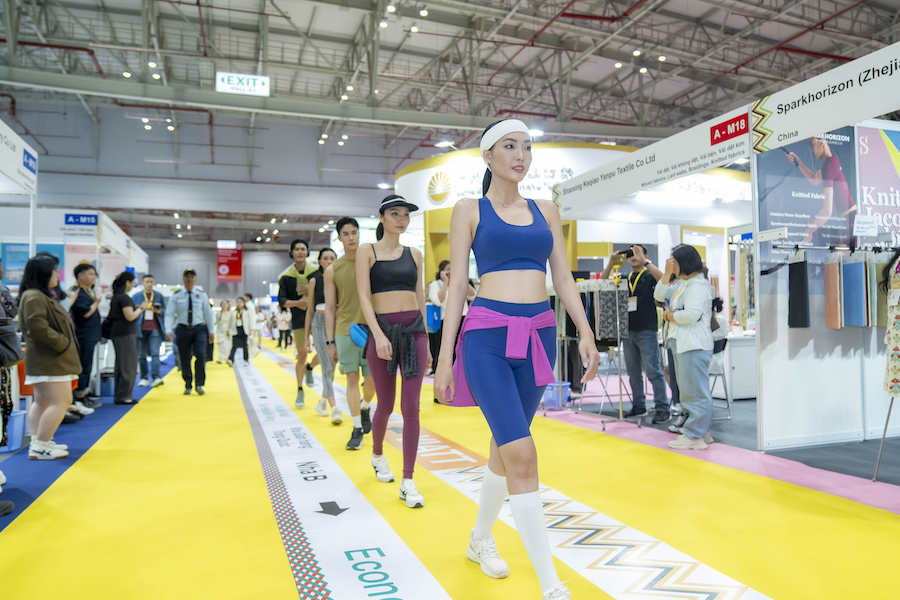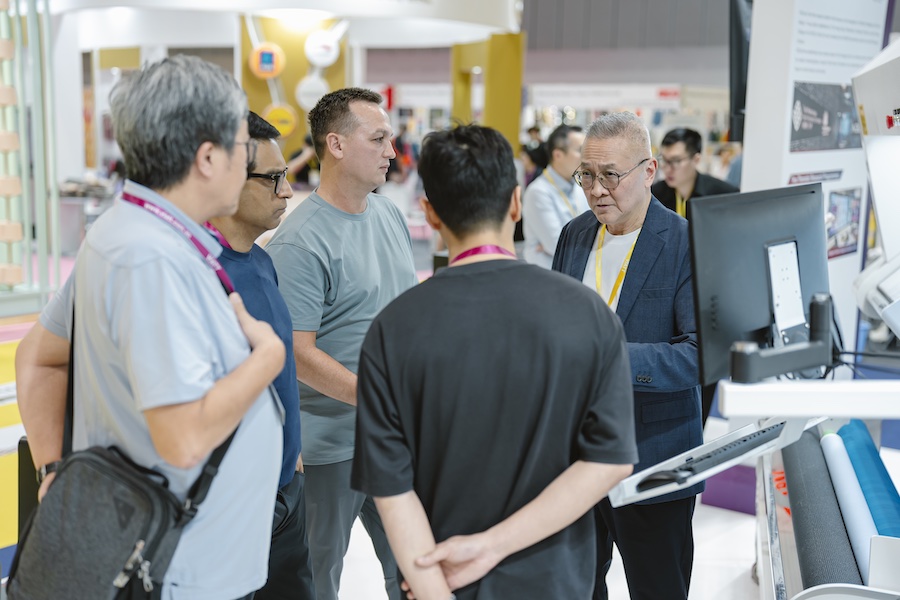#Textiles & Apparel / Garment
The Future of Textiles: Highlights from the 17th ETP Annual European Textile Conference and CITEVE's iTechStyle Summit
Day 1
The first day began with a warm-up session delivered by Dirk Vantyghem, Director General of Euratex, and Lutz Walter, Secretary General of Textile ETP. Dirk Vantyghem provided a comprehensive overview of recent policy developments from the European Union, and highlighted the significance of the textile industry and the introduction of fresh regulations concerning eco-design. Dirk Vantyghem emphasized the transition pathways for textile ecosystems and stressed the pivotal role of innovation in driving sustainable practices, and that the European Union is committed to investing in these pathways to foster sustainability and circular economy. Lutz Walter outlined three major challenges that the industry faces: transitioning to eco-friendly and biobased materials, adopting renewable energy, and embracing digitalization and automation of processes. Overcoming these challenges is crucial for the textile sector to achieve sustainable and innovative advancements.
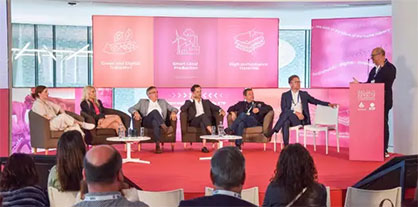
The Tech & Societal Megatrends session featured David Shah, who embarked on a journey about societal polarisation on the fashion industry, with a focus on challenges for retailers and the influence of young consumers on fast fashion and luxury brands. Mico Mineiro went through the growth of Twintex, a company that actively pursued a path towards sustainability and has become a benchmark for various brands. He discussed the company's commitment to quality and highlighted three programs aimed at meeting the quality standards outlined by Lutz Walter. Thomas Gries from ITA RWTH Aachen University presented on the megatrends affecting the textile sector, starting with the industrialization of textiles, followed by biotransformation, and finally, the close alignment of digital transformation with the challenges highlighted by Lutz for the industry. Francesca Rosella, representing Cutecircuit, addressed the intersection of AI with fashion and explored practical techniques and challenges within the metaverse. She discussed the transition from AI-based designs to tangible garments and how technology can enhance this process. Finally, Carmen Danner from HeiQ discussed the topic of cellulosic fibres and shared various experimental endeavours in this area.
During the Textile ETP General Assembly, which took place at the end of the first day, Dr. Marina Crnoja-Cosic was elected new President. Marina brings a wealth of experience and expertise, having dedicated over two decades to fiber and application development, as well as business growth. Her impressive career includes esteemed positions at renowned institutions and organizations such as Kelheim Fibres GmbH. Marina Crnoja-Cosic has been an active board member at Textile ETP since 2019, representing EURATEX - European Apparel and Textile Confederation on behalf of CIRFS: European Man-made Fibres Association. She has significantly contributed to shaping the platform's strategic direction. Marina Crnoja-Cosic will assume her presidency on 1st July 2023 and will be supported by Vice-President António Braz Costa, from CITEVE and representing TEXTRANET, and Vice-President-Treasurer Michael Kamm, representing Euratex.
Day 2
The second day of the event began with a warm-up session delivered by Commissioner Elisa Ferreira, who emphasized the role of Europe in paving the way for circularity and sustainability on a global scale. She highlighted the importance of the EU Textile Strategy in driving the sector in the right direction. Commissioner Ferreira underlined the need for accelerated digitalization of the textile industry and mentioned three key elements for the European textile sector's way forward: innovation, technological cooperation, and value chain optimization. She invited participants to embrace smart technology solutions and sustainable practices, while confirming continued support from the European Union.
The Ecodesign session invited participants to think outside the box and emphasized the goal of ecodesign, which is to keep products usable as long as possible before turning to recycling methods. Silvia Gambi from Polo Universitario di Prato spoke about the value of textile by-products and proposed a mindset shift in how we view and explore their potential value rather than treating them as waste. She highlighted the work in Prato, focusing on the revalorization of wool and cashmere by-products within the textile sector. Ecodesign practices in RadiciGroup were introduced by Claudia Castelli and Loris Maestri through the example of a ski suit designed following ecodesign principles. Stéphan Vérin, Secretary General of Euramaterials, then stressed the importance of collaboration across the textile value chain, particularly in the context of ecodesign. He emphasized the need for stakeholders to consider the next step of the value chain in their decision-making processes.
The session on the Digital Product Passport featured Miguel Sa from Citeve, who emphasized the need for collaboration in making the Digital Product Passport (:) a reality. Università degli Studi di Firenze's Claudia Morea discussed the integration of :s in digital twins, highlighting their potential to improve communication across stakeholders in the product life cycle. Dieter Stellmach from DITF talked about transparency, assessment, and the transition towards a circular textile economy, and Carla Fité Galan from the Universitat Politècnica de Catalunya presented the TRICK project, emphasising the traceability and digitalisation may be the key to decarbonising the economy and adopting a circular development model, transforming linear industrial value chains to minimise waste and pollution, making better use of the waste generated and guaranteeing environmental standards.
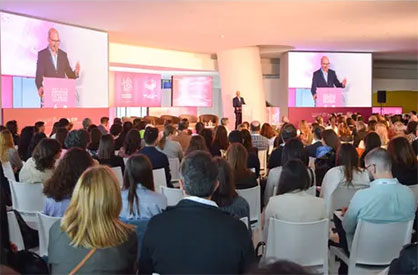
The first Biobased Materials session featured presentations on various initiatives. Lien Van der Schueren from Centexbel and Antje Ota from DITF presented the HereWear project, which aims to empower local, circular, and bio-based textiles. They discussed the project's goals and vision, as well as recent developments such as biopolyester yarns and cellulose filaments. CeTi shared insights into the evolving world of bioplastics and their production, including the regeneration of artificial fibers through green chemistry. TAMK's Virpi Rämö introduced an eco-innovation ecosystem centered around sustainable nonwovens, highlighting the SustaFit project's objectives and potential impact. Daniela Colevati from Centi discussed the integration of nanotechnology into sustainability practices and its wide range of applications.
In the second Biobased Materials session, we discovered biobased processes such as synthetic biology and bacteria-based dyeing, which have the potential to transform the industrial landscape, paving the way for new models of production that prioritize environmental and social responsibility.
Day 3
On the third day, the Smart Manufacturing session began with a keynote by INESC's José Manuel Mendonça, who spoke about artificial intelligence, deep learning, digital twins, and robotization as a way forward in the textile industry. Peter Buttiens from ESMA discussed the challenges of transitioning from rotary-screen printing (that still represents 92% of textile printing) to digital and more sustainable textile printing. João Bernardo, CEO of Mind, shared insights and lessons learned in the automatic cutting of textile materials.
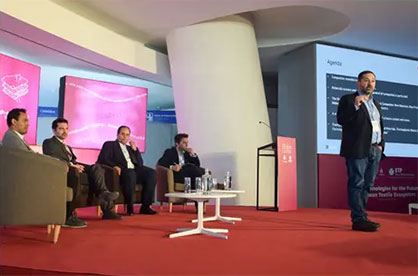
The Performance Materials sessions in the afternoon featured discussions on smart textile and advancements in high-performance materials for future products. The research and development approach for the erosion control system focused on using geotextiles was introduced by Joana Teixeira from the Associated Laboratory for Green Chemistry. Another presentation showcased a range of applications for smart wearables, highlighting advancements in textiles and composites. António Marques from CeNTI demonstrated various technologies and discussed the potential benefits of smart wearables in promoting health and well-being. Specifically, the Smart Health for All project was introduced, which aims to leverage smart wearables for healthcare applications. Pulkit Mishra from TITV also presented a smart textile product: the Body Worn Smart Shirt, that was introduced as an innovation crafted from circular materials that are biocompatible and designed for telemedicine. The presentation also touched upon other advancements in the healthcare sector aimed at upgrading the healthcare system.
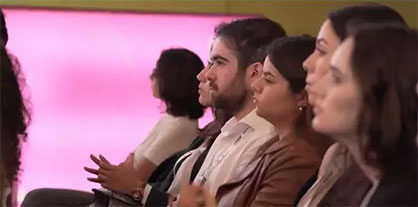
Overall, the 17th ETP's Annual European Textile Conference and General Assembly and CITEVE's iTechStyle Summit provided a platform for industry leaders, experts, and academia to exchange knowledge, share insights, and explore innovative solutions in the textile sector. The diverse sessions covered topics ranging from ecodesign and biobased materials to smart manufacturing and sustainable fashion. It fostered collaboration and highlighted the industry's commitment to sustainability, circularity, and technological advancements.







